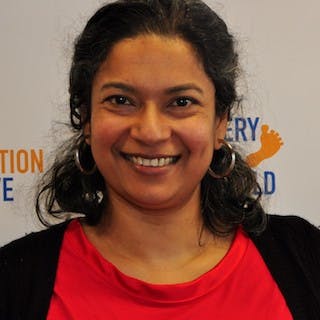The United States and the United Nations have an important relationship. The UN was founded in San Francisco and its headquarters is in New York. The U.S. is the UN’s largest funder and a permanent member of the Security Council. Strong partnership between the U.S. and the UN have helped address pandemics, sanction rogue regimes, reduce hunger, enable more children to go to school, and stabilize fragile countries through peacekeeping.
In addition, many Americans work at the UN, helping improve the lives of people in the U.S. and around the world. Over the coming weeks, the UN Foundation will be sharing many of their stories as part of our “Americans in the UN” project.
Our first interview is with Sona Bari, whose roots are in Minneapolis and who works in Geneva at the World Health Organization, leading communications on polio eradication.
Jenni Lee: From your experience, what is an example of how the UN has made a difference in someone’s life?
Sona Bari: I could draw on so many. I take my children regularly to the pediatrician, who measures them against growth charts. The standards in those charts are set by the World Health Organization, the UN’s health agency. My husband’s family was in an exchange of prisoners of war and was airlifted out by the UN. How healthy is the air we breathe? The UN standards tell us. The story in the next question is also a stark personal example.
JL: How did you first learn about the UN?
SB: From my father’s work as an international human rights lawyer working for refugees. But I didn’t come to the UN until much later, after a career in journalism. My father joined the UN when I was a teenager, and while I absorbed a lot from conversation with him at home, it was one particular experience that drove its importance home to me.
One day, I got in a taxi in Paris and started chatting to the driver, who was a refugee from Vietnam. When I told him that my father worked for the UN Refugee Agency, he told me his story with tears in his eyes and his voice of how they fled the country and how he spent years in a refugee camp before being settled in France. “Tell your father, if it were not for people like him, I would not be alive today,” he said. He refused payment for the taxi ride.
JL: What is your message to Americans about the importance of the UN?
SB: We are part of a world community. The UN brings unseen and untold richness to our life; with all its weaknesses and room for improvement, we cannot function without that community and the rules that govern it.
JL: When you talk to your friends and family about working for the UN, what is something that surprises them?
SB: They are surprised that we do practical things like airdropping food, and that we are often in harm’s way, in conflict zones. And they are surprised that the many esoteric conventions and agreements have real-life implications, like how much sugar you should eat or how to care for someone with dementia.
JL: What motivates you to work for the UN?
SB: Corny as it sounds, I work here because it makes a difference. Every child vaccinated is a child saved from a deadly disease, and I know my work contributes to that. Working in the UN is also a lesson in humility: You learn how much better someone else’s solution is, how much more equitable someone else’s society is.
JL: What is the favorite part of your job?
SB: My favorite part of my job is working with vaccination planners and teams during their long days, especially women. I always learn so much from them, about what we have in common, but also about what we disagree on. And it helps me be flexible and humble.
JOIN US: “Are you an American interested in supporting the UN? Sign up for updates from our sister organization, the Better World Campaign, for opportunities to take action.”

